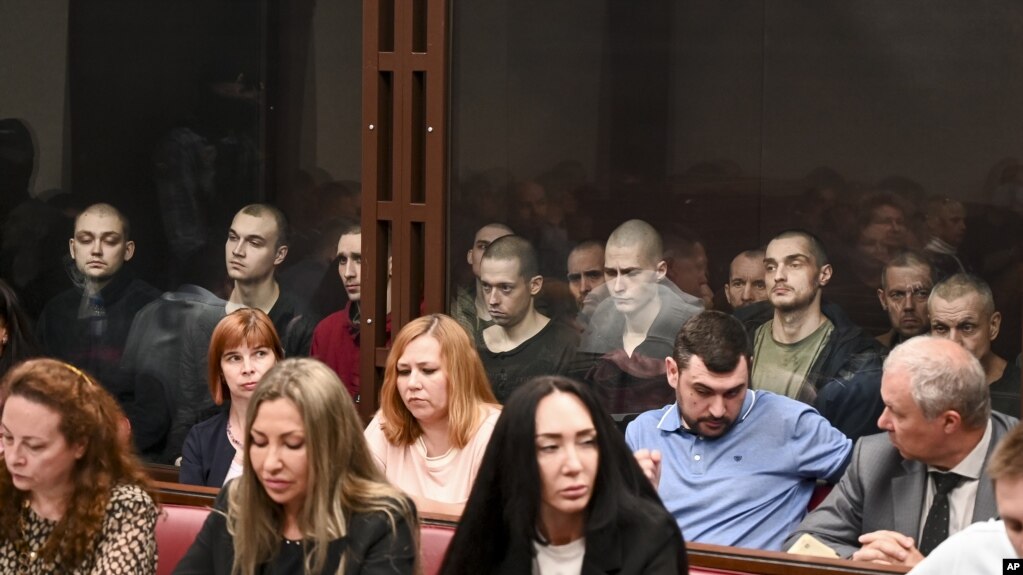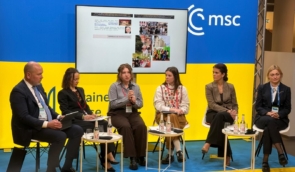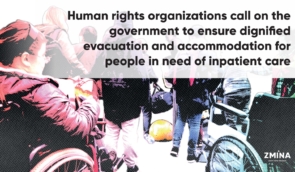Russia stages show trials of Ukrainian prisoners of war: OSCE report cites ZMINA research
The Organisation for Security and Co-operation in Europe (OSCE) published a new report prepared within the framework of the Moscow Mechanism, which is dedicated to the situation of Ukrainian prisoners of war in Russia and the temporarily occupied territories of Ukraine.
 The trial of Ukrainian Azov prisoners of war in Rostov-on-Don. Photo credit: Associated Press
The trial of Ukrainian Azov prisoners of war in Rostov-on-Don. Photo credit: Associated PressThe mechanism was activated on 24 July 2025 at the initiative of 41 OSCE participating States after consultations with Ukraine. On 15 August, an expert Mission was established, including Professors Hervé Asensio (France), Veronika Bilková (Czech Republic) and Mark Klamberg (Sweden).
The Mission concluded that Russia’s treatment of Ukrainian prisoners of war is widespread and systematic and may constitute a war crime of “illegal treatment of prisoners of war” and a crime against humanity of “imprisonment or other severe deprivation of physical liberty in violation of fundamental rules of international law”.
OSCE experts documented:
- Mass torture, cruel, inhuman and degrading treatment, including sexual violence;
- Arbitrary executions and killings of Ukrainian military personnel, including after their surrender;
- Deliberate failure to provide adequate food, medical care and basic living conditions, resulting in deaths in places of deprivation of liberty;
- The use of prisoners for propaganda purposes and the conduct of sham trials in violation of the Third Geneva Convention.
Since February 2022, at least 13,500 Ukrainian soldiers have been captured by Russia, of whom roughly 6,300 remain in captivity. At least 169 people have died in captivity, and nearly 6,800 have been released and repatriated.
Russia systematically denies Ukrainian military personnel prisoner-of-war status, referring to them as “persons detained for opposing the SVO”. This approach blurs the line between military and civilian detainees and creates grounds for the unlawful criminal prosecution of combatants for participating in hostilities.
The Mission also noted that the Russian Federation refused to cooperate with OSCE experts, which further indicates its responsibility for the crimes documented.
The OSCE report refers to a joint analytical research paper “Denial of the right to a fair trial as an international crime during Russia’s war against Ukraine: context, practice, law and prospects” by the Human Rights Centre ZMINA, Media Initiative for Human Rights, Crimean Process and Graty.
This research demonstrates that Russia’s denial of the right to a fair trial to Ukrainian prisoners of war and civilians constitutes a war crime and a crime against humanity.
“In the context of these criminal proceedings, numerous violations of the right to a fair trial have been documented, some of which are systematic in nature. The ZMINA and MIHR investigation revealed the bias of judges, the lack of publicity of court proceedings, and the complete erosion of the presumption of innocence,” the OSCE report states.
The Head of the Board of the Human Rights Centre ZMINA, Tetiana Pechonchyk, emphasised that this OSCE report is an important element in documenting Russia’s war crimes: “We are pleased that ZMINA’s work has become part of the evidence base for international institutions and partners“.
The Ukrainian Ministry of Foreign Affairs also welcomed the publication of the report, calling it “a comprehensive international document dedicated to the systematic crimes of the aggressor state against Ukrainian prisoners of war”.
On 9 July 2025, the European Court of Human Rights (ECtHR) announced its decision in the case of Ukraine and the Netherlands v. Russia, which was one of the most anticipated and important decisions in the history of international justice regarding Russian aggression against Ukraine. In this decision, which covers the period from 2014 to September 2022, Russia is found responsible for numerous violations of human rights guaranteed by the European Convention on Human Rights. Among other materials, the court refers, in particular, to four analytical reports prepared by the Human Rights Centre ZMINA. In particular, the following materials were used:
- Analytical note “Deportation of Ukrainian citizens to the territory of the Russian Federation: signs and context” (April 2023).
- Analytical note “Forcible transfer and deportation of children from the temporarily occupied territories of Ukraine to the Russian Federation” (April 2023).
- Report “Enforced disappearances and arbitrary detentions of active citizens during the full-scale armed aggression by Russia against Ukraine” (June 2023).
- Analytical note “Deportation of residents of Kherson region: organised and independent departure under coercion” (July 2023).
The authors and editors of these research papers are members of the Human Rights Centre ZMINA team: Legal Analyst Onysiia Syniuk, Advocacy Director Alena Lunova, Human Rights Expert Nataliia Okhotnikova, Research and Analyst Borys Petruniok, Project Manager Oleh Hnatiuk, and Human Rights Advisor to the World Organisation Against Torture (OMCT) Mariia Kvitsinska. Documentarian Nadiia Dobrianska and journalist Elina Sulima collected some of the cases used in the research. Data for the reports was collected in cooperation with the Ukraine 5AM Coalition. The preparation of the reports was supported by Freedom House Ukraine and the Ukraine Confidence Building Initiative (UCBI).
If you have found a spelling error, please, notify us by selecting that text and pressing Ctrl+Enter.















